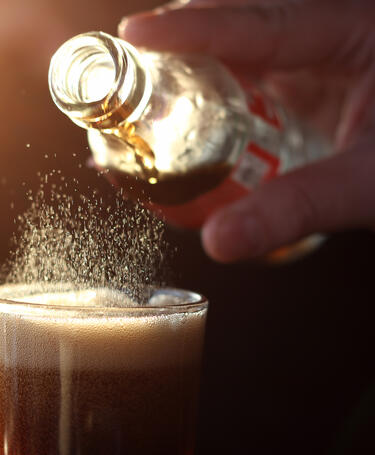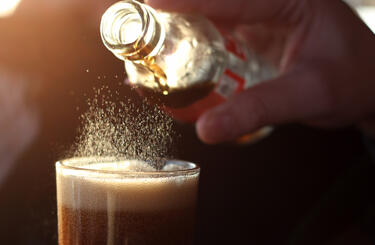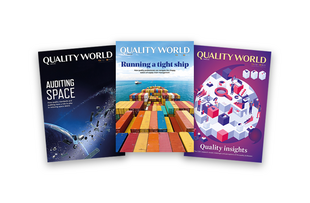
The magic ingredient
Progress indicator

Take a look inside Coca-Cola’s operating requirements brochure, KORE, then read Amanda Pauley’s interview with Coca-Cola’s global director of quality and food safety strategy, policy and programmes, Neil Marshall.
As one of the most recognised brands in the world and with more than 125 years’ experience in the drinks industry, The Coca-Cola Company has earned quite a reputation.
But scratch beneath the surface of its catchy marketing campaigns, such as last summer’s ‘Share a Coke with,’ and you’ll find there’s actually a lot more to Coca-Cola than just Coke.
As the largest beverage company in the world, the company’s portfolio includes 16 'billion-dollar brands”' from Powerade and Minute Maid to Georgia and Del Valle.
However, a company as successful as Coca-Cola doesn’t achieve global fame without a considerable amount of work on quality and food safety. The complex organisation prides itself on being innovative and forward-thinking, and places great emphasis on the voice of the customer.
Neil Marshall, global director of quality and food safety strategy, policy and programmes, spoke to Quality World about Coca-Cola’s quality approach, learning from past mistakes and how, for them, doing things the hard way is the right way.
Is there an overall ethos to the Coca-Cola approach to quality?
NM: We have a tagline, ‘Perfect Product Trusted Everywhere’, which we’ve embedded into our quality policy for the past four years. The phrase was released with our updated Company Quality Policy in January 2010.
Do you use a specific quality management system, such as ISO 9001 or EFQM, or has Coca-Cola developed its own bespoke system?
NM: "We like to do things in an even more thorough manner and have developed our own bespoke compliance requirements and policy system, known as KORE, as well as using ISO.
"We have more than 1,000 manufacturing plants in more than 200 countries, and in all of those plants, we require them to be compliant with KORE, as well as being certified to IS0 9001, and Food Safety System Certification 2200 standards.
"KORE gives us a strong management system foundation to work with, combining the discipline of producing a high-quality product with the flexibility of achieving global implementation.
"However, it’s vital to us that our factories are also compliant with the ISO standards. We use third-party auditors to audit the factories for ISO requirements, and use our own internal audit group to audit for compliance to KORE. It’s a rigorous and sometimes very demanding auditing programme, but we manage to keep on top of the tight schedule using our 30 internal auditors, who audit full time."
What quality objectives has Coca-Cola set and what do you want them to achieve?
NM: "We want to achieve our slogan of the ‘Perfect Product Trusted Everywhere’, so we’ve developed a roadmap for quality that is directly aligned to the business. Our technical objectives, which include quality, are in support of the Chairman’s “2020 Vision” – a roadmap developed with our bottling partners to double our system revenue by the year 2020 – and we’ve developed targets for all our brands.
"Individual objectives are set about what we’re supposed to do, especially around profit, people, portfolio, planet and productivity, but the overriding business plan is there for everybody to drive against.
"Quality is embedded throughout the organisation, but we’ve also created a 2020 quality vision as it’s that important to us."
How do you ensure the quality message is implemented and understood across a large company working in many sites?
NM: "We recognise that this is a challenge, especially as our organisation is large and we have a lot of people to reach. Our management system requires that everyone who works for Coca-Cola has access to our policy and requirements, so we regularly post documents onto our internal website to keep employees in the know.
"For the 2,000 employees in technical, we also have a unique portal called ‘The T’ which acts as a gateway to new informative content, programmes and links, and although designated to this team, anyone with a Coca-Cola ID can access it. It’s a powerful channel that serves as an educational tool."
Do different working cultures require different approaches to quality around the world?
NM: In a way, yes, but only in terms of communication. Changing programmes or strategies requires the most communication because the diversity of our organisation means we have to tailor to the needs of various parts of the world.
"This, of course, is challenging, especially as we’re in a franchise system. The Coca-Cola Company is the franchise owner, and in some cases we’ve invested in local bottlers around the world.
"However, we certainly have more input than other franchises and we’ve found our influence and collaboration are not only needed, but sought after."
How do you see the role of quality in supporting the global Coca-Cola brand?
NM: Quality has always been massively important for Coke. We have a responsibility to support our $16bn brands around the world, whatever role we’re in, and need to be seen as actively supporting and protecting our products.
"We’ve recently launched our first-ever ambassador programme for employees to educate them on our heritage and plans, as they need to understand Coke from the inside out.
"Over the past five years, we’ve starting looking outwards more than we used to and now actively engage with other food companies on a corporate and local level, as well as with external organisations such as Quality World, which we were less likely to do before."
How does the quality function at Coca-Cola achieve buy-in from other parts of the business?
NM: "This is a non-stop challenge that we’re constantly working on. We have technical associates at varying levels and five group structures where technical and quality people are split into geographic locations around the world.
"Each group has multiple business units to look after and each level has a Quality Director leading each of the country groups. We also have 350 bottling companies directing activities in our 1,000-plus plants, and we employ quality managers to supervise those carrying out quality assurance tests.
"Quality is embedded at all levels and I would say there are very few other food companies that have as many quality-focused resources. Quality is on the business agenda and a lot of that is about taking note of how the world is changing.
How do you gain top management support for the quality team and how can this be demonstrated?
NM: "We have a long history of quality programmes and gaining support, but it’s probably most easily demonstrated externally by the number of QSE (Quality, Safety, Environment) employees we have in the corporate team and number of technical associates in the business units.
"We know we need leaders who are respected and can talk the business language, but without being too technical. At Coke we have phrases we use, such as “give me the elevator speech” or “tell me what you want in 30 seconds,” because if you talk too much quality jargon, people won’t follow what you’re looking for.
"We make our message as simple as we can while making sure it’s related to the business language, as a mix of the two is how you get the support and budget from top management. We also make sure any examples we talk about are real, such as a recalls, because you have to turn the issue back to why something has happened in order to change and improve.
In light of problems encountered in the food supply chain in Europe, how does Coca-Cola work with the up/down stream value chain to ensure product quality and safety?
NM: "Well, apart from the rigorous management processes in place in the plants, we’ve also mandated the Global Food Safety Initiative (GFSI) for our suppliers. It’s important they do the same as what we ask of our manufacturing plants in order to go back up the supply chain.
"We’re extremely active in GFSI, along with other major manufacturers and retailers, to try to make sure our suppliers adopt the same quality approach as us and our customers. We truly believe in an end-to-end approach to quality throughout the supply chain.
"The other thing Coke has done, from a customer and consumer perspective, is ask what they think we do well. In 2008, we changed our quality management system to meet the external ISO 9001 standard as customers, such as Walmart, wanted us to meet their requirements.
"Initially, we debated the idea as we already had our own internal systems in place, but it was a futile debate because all the big companies were asking for the same thing. So, we aligned our expectations with the customer and now, through our participation in GFSI, we can engage externally with different suppliers and customers to talk in a non-competitive space about food safety and quality.
"This forum also allows us to try to create a harmonised approach from supplier to consumer – it’s been a huge change for us."
Do you conduct supplier audits or outsource this to an independent, third-party body?
NM: "We actually do both. We have our own people based in the locally-producing business units who audit primary packaging and ingredient suppliers, and we have global supplier groups that conduct supplier development activities with global suppliers.
"We’ve also followed Walmart’s lead by asking our 5,000 suppliers to achieve certification to a GFSI scheme. This transparent approach has really changed the industry."
1. KORE works to ensure its promise of quality products an
services through the gold standard of ‘Perfect Product, Trusted
Everywhere.’
2. Governance is at the heart of what KORE does, covering desired
outcome as well as the manner in which the requirements can
be achieved.
3. The framework is designed continually to meet customer and
stakeholder requirements and has enough flexibility to be
adapted to changing needs and expectations.
4. It covers four key policy areas; Quality (commitment to quality in
all that they do), Food Safety (adherence to food safety systems,
processes and controls), Environment (position as environmental
leaders) and Occupational Health & Safety (idea that people are
the most valuable resource), which align with the Chairman’s
2020 vision.
5. Specifications are in place on things such as ingredients,
products and packaging, so the company can monitor that
all products conform to the necessary quality requirements.
1. The streamlined approach includes only the minimum
company requirements needed to protect trademark and
product integrity, so operations have flexibility in determining
the best way for them to achieve compliance.
2. The management system applies across Coca-Cola’s network
of suppliers, operational facilities and partner organisations,
giving a standardised approach.
3. Coca-Cola has further increased its focus on food safety,
encouraging alignment with the highest international standards
and also continuing to meet applicable government, legal and
local regulations.
4. KORE includes five levels: Policies, Standards, Specifications,
Requirements and References, covering every aspect of
Coca-Cola’s operation.
10. The KORE operating requirements were developed
with employees from a range of different functions and
geographical regions.
You’ve worked at different operation levels and in different territories for Coca-Cola. Have you found any notable differences in the approach to quality in the UK and US?
I would say, probably because I’m from the UK and have a strong manufacturing background, that ISO is more predominant in the UK than the US. The UK has a long history with the use and deployment of ISO 9001 in facilities, whereas in the US it’s not adopted as much because I think some perceive it as too prescriptive.
However, the deployment and popularity of GFSI is helping it gain momentum with a steady increase in ISO 22000 and the FSSC 22000. Europe led the quality agenda and a lot of the changes we implemented globally came out of things done there.
There have been very few product recalls for Coca-Cola compared with other organisations. Why do you think you can consistently create a quality product?
I think it boils down to the fact that we try not to be complacent and assume we have all the answers. We have programmes, such as our crisis management programme – Incident Management and Crisis Resolution (IMCR) – which prepare us for incidents, and our cross-functional teams include people from legal, marketing, quality and manufacturing, so we’re equipped for product recalls or security issues.
Not to mention, we have a very good consumer complaint programme where we investigate complaints through our freephone numbers and collate the data to diagnose, follow up and investigate the issues at manufacturing level.
Our factories’ rigorous quality programmes help to keep up consistency around the world and when we face issues such as copycats, where counterfeiters try to copy our brand, we deal with it effectively through our strong relationship with the authorities. That level of trust and transparency is vital and there’s no turning back on it. Every company needs to be open about what they’re doing and how they respond.
What does 2014 hold for Coca-Cola?
The FIFA World Cup is heading to Brazil and that’s a big deal for us, so we’re currently flying the trophy around the world in a bespoke Coca-Cola jet. In terms of quality and our programmes, we’ll continue our mission to be more efficient in what we do and strive to make the most of our people.
Read about Coca-Cola’s bespoke compliance requirements and policy system below.
Member only

This article is free to access for a limited time only. Only CQI and IRCA members receive access to all content.
Search the eLibrary
The eLibrary has thousands of articles, journals, reports and magazines.
